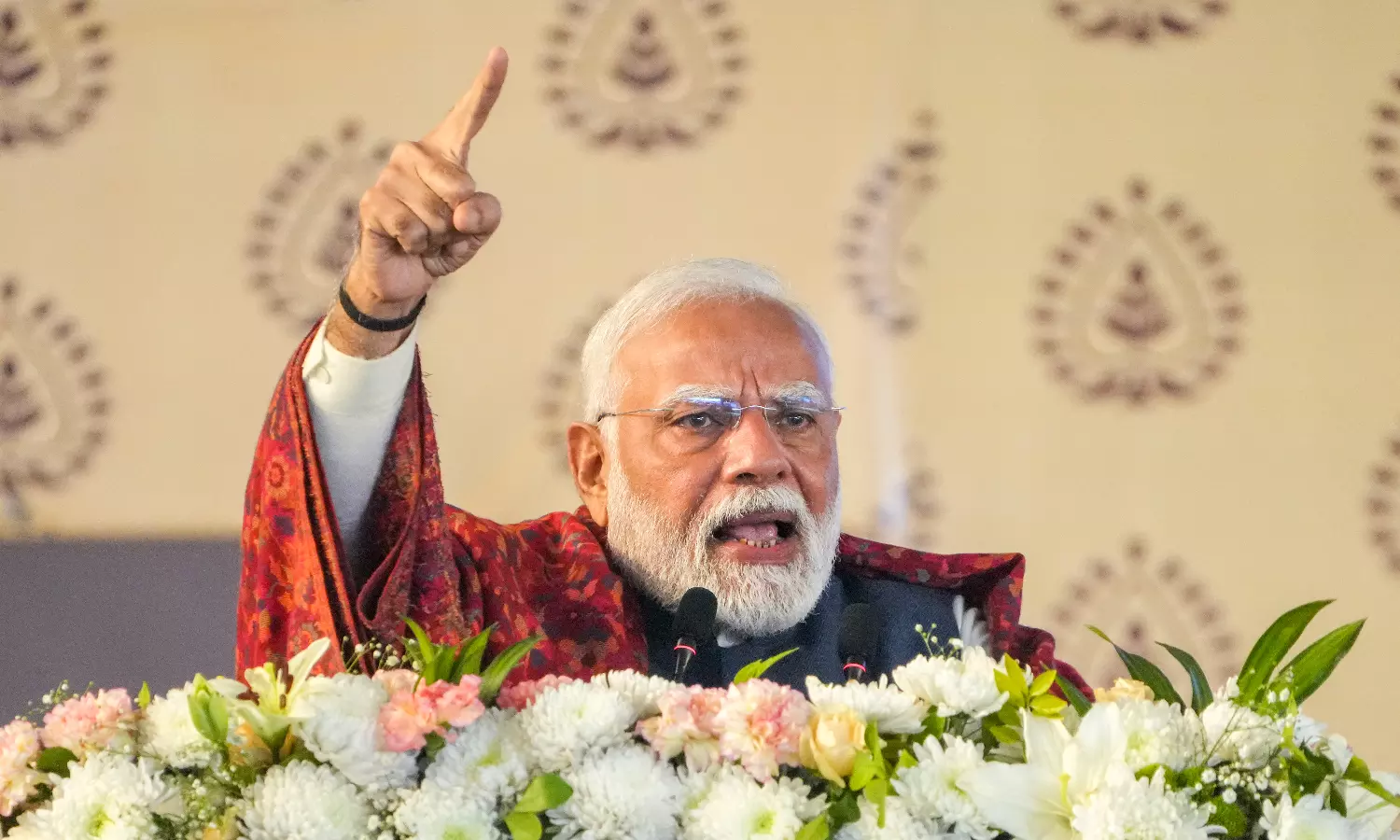
�New Delhi: Calling the AAP an “aapda” (disaster) for Delhi, Prime Minister Narendra Modi on Friday said that this aapda has taken the national capital in its grip in the last 10 years and said that the situation will worsen if its reign continues.
Addressing a gathering after launching a slew of infrastructure projects in the national capital, Mr Modi hit out at the AAP government, accusing it of committing corruption in school education, the fight against pollution and liquor trade, among others.
"On the one hand, the Centre is making a lot of efforts for Delhi; on the other, the UT government stands for brazen lies," he said.
With the Assembly elections set to be held next month, Mr Modi said Delhi has launched a war on aapda. “This year ushers in a new politics of nation-building and people’s welfare. Therefore, the aapda has to be removed and the BJP needs to be brought in,” he said.
The Prime Minister on Friday inaugurated a slew of development initiatives, including 1,675 flats for the residents of JJ clusters, two urban redevelopment projects — the World Trade Centre (WTC) at Nauroji Nagar and the general pool residential accommodation (GPRA) Type-II Quarters at Sarojini Nagar — CBSE's Integrated Office Complex at Dwarka and three new projects in Delhi University, including a college named after Veer Savarkar.
Taking a swipe at AAP chief and former Delhi chief minister Arvind Kejriwal, Mr Modi said that he could also have built a "Sheesh Mahal" for himself, but his dream was to ensure homes for everyone in the country.
"These people commit corruption and then glorify it," he said, accusing the AAP of shamelessness and making false promises.
The Prime Minister noted that on one side, the Central government is making efforts for the education system in Delhi, while on the other side, there are the outright lies of the Delhi government.
“The AAP government of Delhi has caused significant harm, particularly by mismanaging funds meant for education. The situation is such that the funds allocated under the Samagra Shiksha Abhiyan were not even spent on the children's education by the Delhi government,” he said.
Mr Modi alleged that the past 10 years have been marked by corruption and scams in various sectors such as liquor contracts, school education, healthcare for the poor, pollution control and recruitment.
“Some hardcore corrupt individuals, using Anna Hazare as a front, have pushed Delhi into this crisis,” Mr Modi said, adding that Delhi has always envisioned good governance but the ruling AAP government has failed to deliver on its promises and has only worsened the situation.
“As a result, the people of Delhi are determined to fight against this crisis, vowing to bring change and rid the city of this corruption,” he said.
The Prime Minister highlighted that the Central government is handling major projects in Delhi like roads, metro systems, hospitals and college campuses. “The AAP government, however, has failed to fulfill its responsibilities, especially in areas like the cleaning of the Yamuna river. Neglecting the Yamuna has led to a crisis where people are left with dirty water,” he said.
Mr Modi emphasised that his goal is to ensure that the benefits of good national schemes reach Delhi. “The Central government's policies have provided the poor and middle class with both financial benefits and savings. The government is also making electricity bills zero and offering opportunities for families to produce electricity. Through the Pradhanmantri Suryaghar Muft Bijli Yojana, families are becoming electricity producers, with the Central government offering Rs 78,000 to help install solar panels,” he said.
The Prime Minister highlighted that the Central government is providing free rations to nearly 75 lakhs needy people in Delhi and the "One Nation, One Ration Card" scheme has been a great help to the people of the city.
The Prime Minister mentioned that around 500 Jan Aushadhi Kendras have been established in Delhi to provide affordable medicines at over 80 per cent discounts, helping people save thousands of rupees every month.
Mr Modi further noted that he wants to provide the people of Delhi with the benefits of the Ayushman Scheme, which offers free treatment, but the AAP government is not allowing its implementation. As a result, the people of Delhi are suffering.
Emphasising the Union government's commitment to improving the lives of the people of Delhi through the world’s largest health insurance scheme, the Prime Minister said, “The Central government has extended the Ayushman Bharat Yojana to include elderly citizens above the age of 70. However, the people of Delhi, especially the elderly, are not benefiting from this due to the selfishness, arrogance and stubbornness of the AAP government.”
Mr Modi stated that the Central government is working with full sensitivity to address the needs of Delhi’s residents. He also highlighted the Centre's efforts to regularise colonies in Delhi, adding that it benefitted lakhs of people. He criticised the AAP government for failing to provide essential services like water and sewerage in Delhi and assured the people of Delhi of resolving these issues.
Highlighting the ongoing progress in Delhi’s infrastructure development, such as the provision of piped natural gas to every home and the construction of new highways and expressways, the Prime Minister said, “Because the state has no interference in these projects, work is progressing swiftly. These developments are crucial to improving the lives of Delhi’s residents.”
The Prime Minister also mentioned the recent traffic solutions proposed for including the construction of a tunnel from Shiv Murti to Nelson Mandela Marg and the connection of several key expressways. “These proposals have been approved and will significantly reduce traffic congestion in the future,” he said.
Outlining his vision for 2025, the Prime Minister said, “The year 2025 will bring a new era of good governance in Delhi. It will strengthen the spirit of ‘nation first, countrymen first,’ and mark the launch of a new politics focused on nation-building and public welfare.

